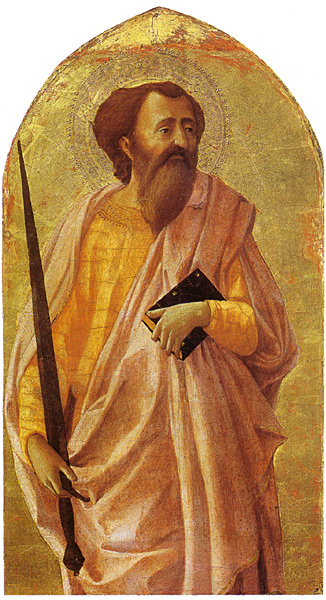 Sunday was the annual Feast of Sts. Peter and Paul, but the focus this past weekend was on the Apostle to the Gentiles, in light of the inauguration by Pope Benedict XVI–along with Ecumenical Patriarch Bartholomew of Constantinople –of the Pauline Year to mark the 2,000 year since the birth of Saul, who Greek-speaking Christians came to know as Paul. The rest of us came to think of him as the “second founder” of Christianity, after Jesus. No surprise, given his outsized contribution to the New Testament and to the spreading of the Gospel–and also to the spiritual legacy of the church. But it has been a conflicted legacy in many ways, which is being addressed with a resurgence of great scholarship on Paul. Revisionism? Perhaps? Or just getting it right, finally?
Sunday was the annual Feast of Sts. Peter and Paul, but the focus this past weekend was on the Apostle to the Gentiles, in light of the inauguration by Pope Benedict XVI–along with Ecumenical Patriarch Bartholomew of Constantinople –of the Pauline Year to mark the 2,000 year since the birth of Saul, who Greek-speaking Christians came to know as Paul. The rest of us came to think of him as the “second founder” of Christianity, after Jesus. No surprise, given his outsized contribution to the New Testament and to the spreading of the Gospel–and also to the spiritual legacy of the church. But it has been a conflicted legacy in many ways, which is being addressed with a resurgence of great scholarship on Paul. Revisionism? Perhaps? Or just getting it right, finally?
CNS’s blog has a roundup of resources to get us kick-started, but I’d also highly recommend this Tablet essay by an English Jesuit, Nicholas King, who frames Paul nicely. Here’s a sample:
There is no doubt at all of Paul’s humanity: he is a passionate lover, and a prickly, irritable authoritarian, both at the same time. He is a gifted theologian (one of the three unmistakably great minds in the New Testament), with a startling ability to think on his feet when faced with new and unforeseen situations.
One of Paul’s strengths is that he is at ease in at least three backgrounds. He is, according to Acts, a Roman citizen. Then he clearly belongs in the Hellenistic world into which he was born at Tarsus, and to which he spent the last 30 years of his life preaching. Finally but by no means least in importance, he is a Jew who took his Law-based Pharisaic Judaism immensely seriously, and if Acts has it right he studied under the great Pharisee teacher Gamaliel.
All three of these backgrounds are important to Paul, though he has reservations about each of them…
